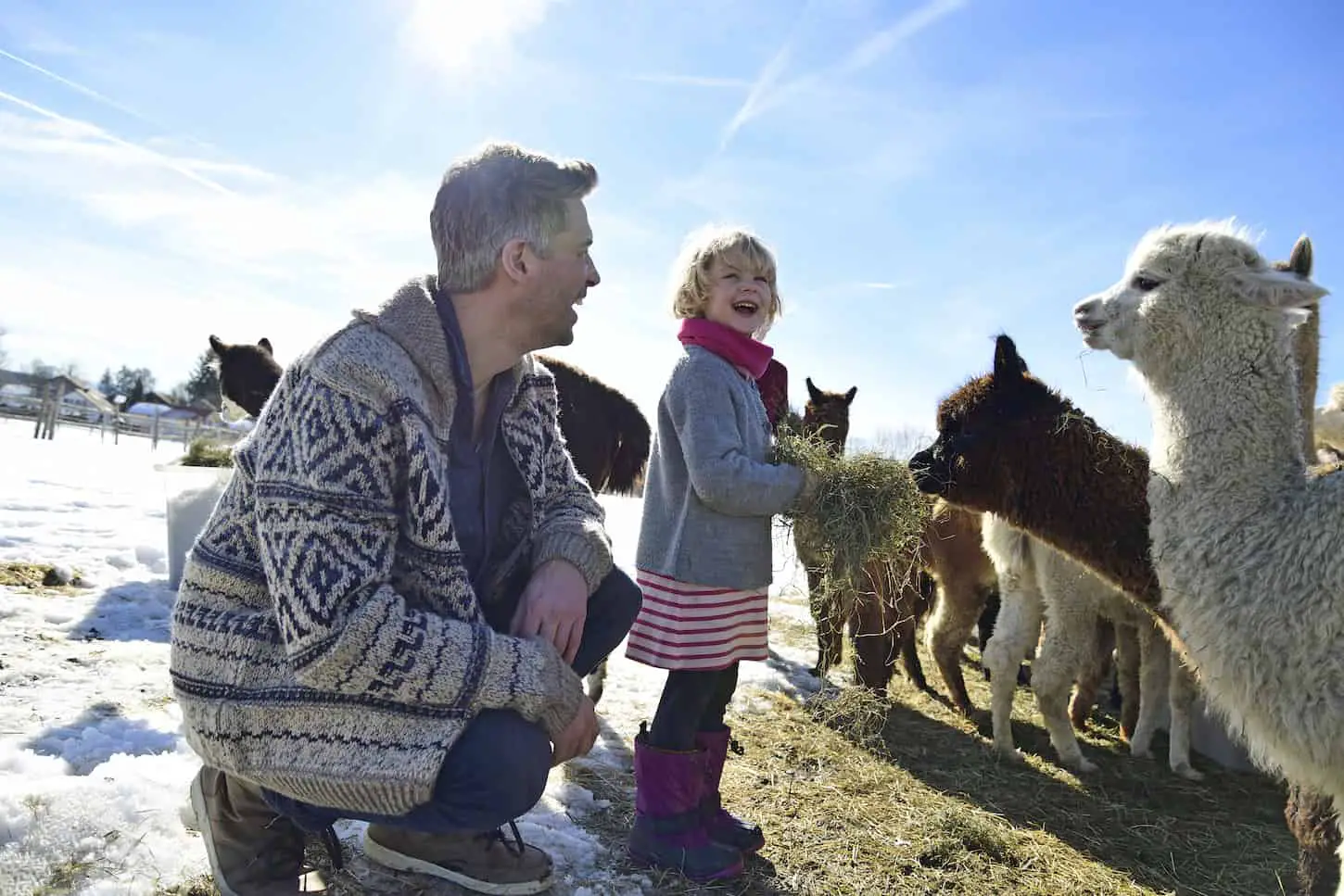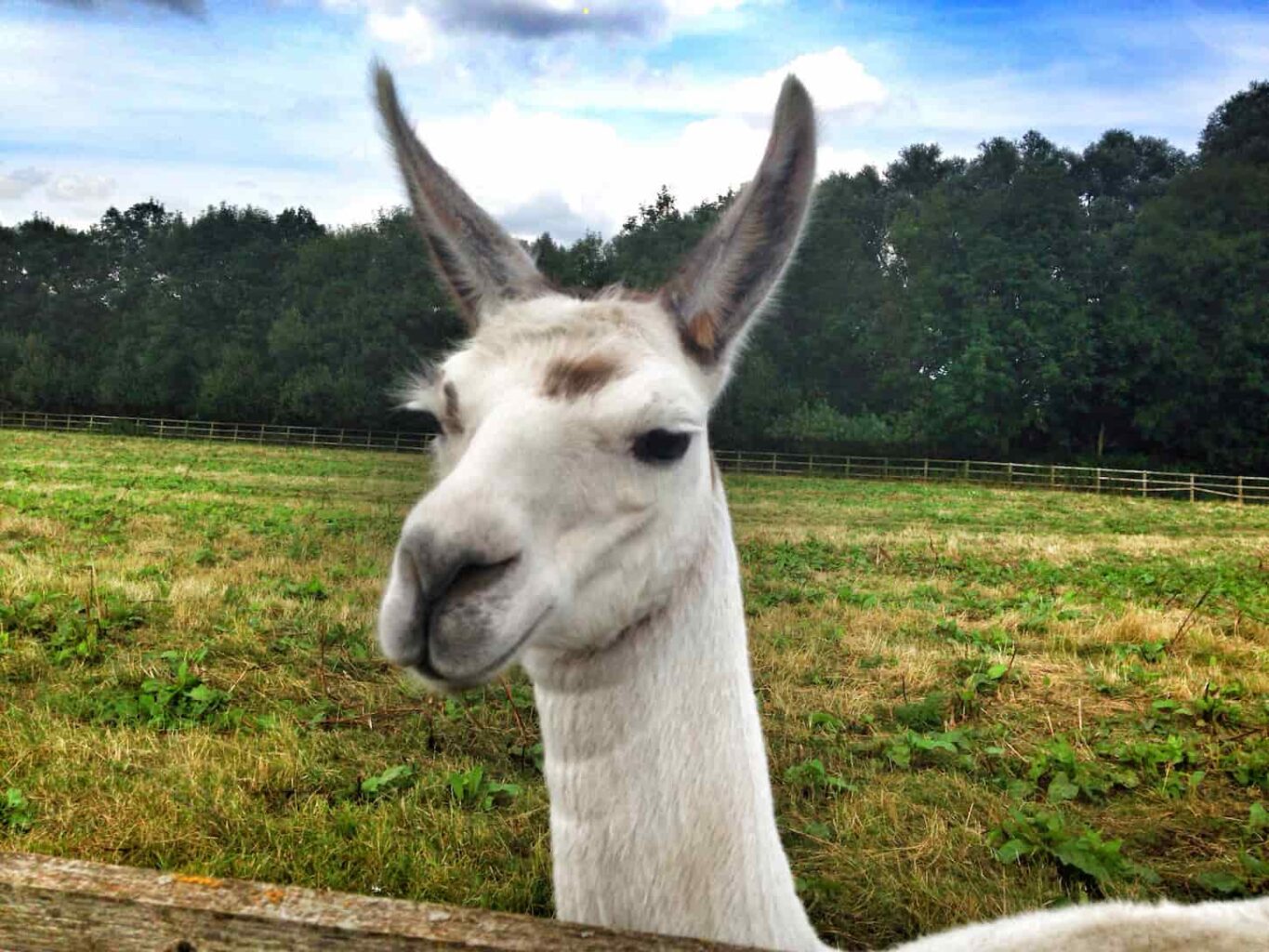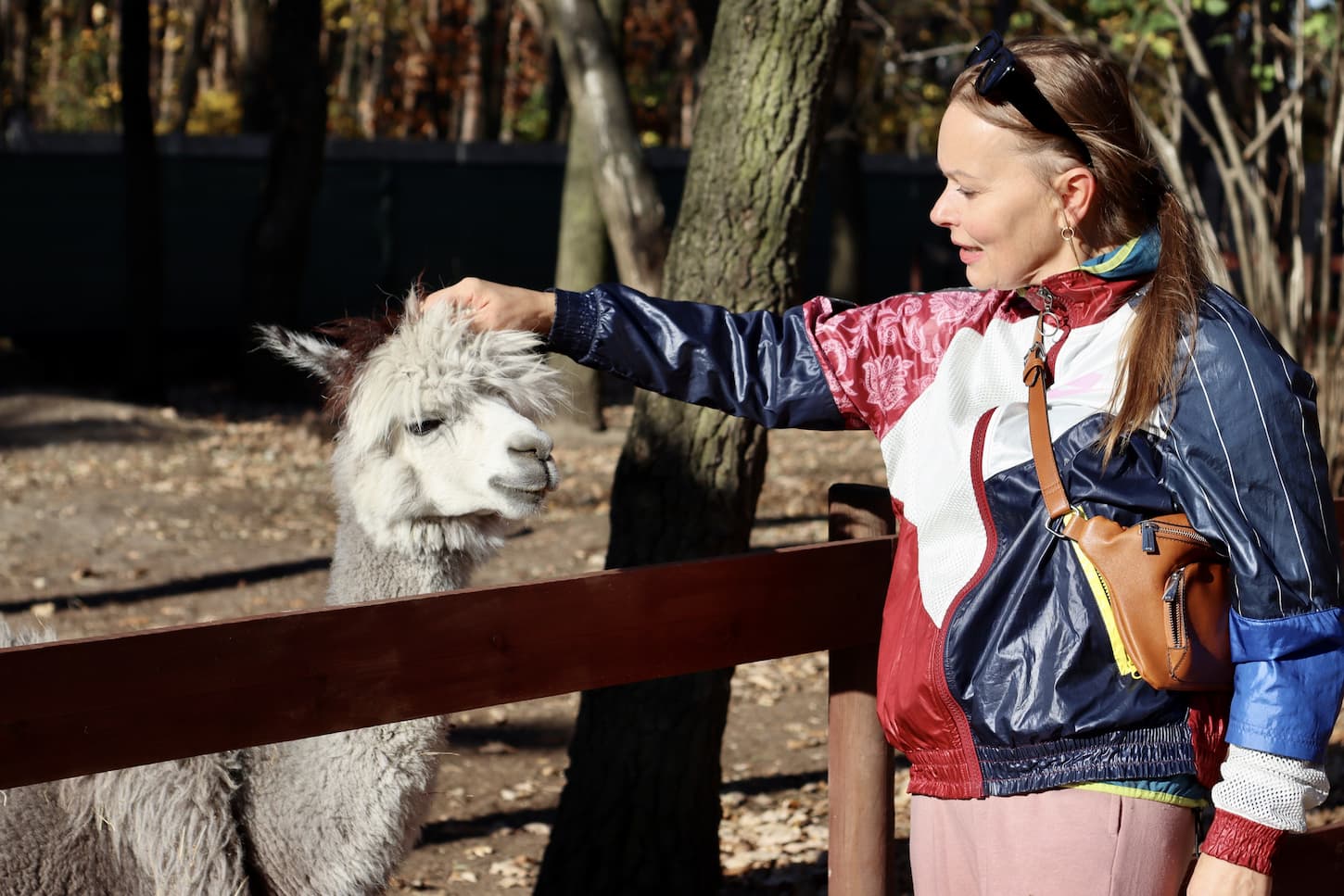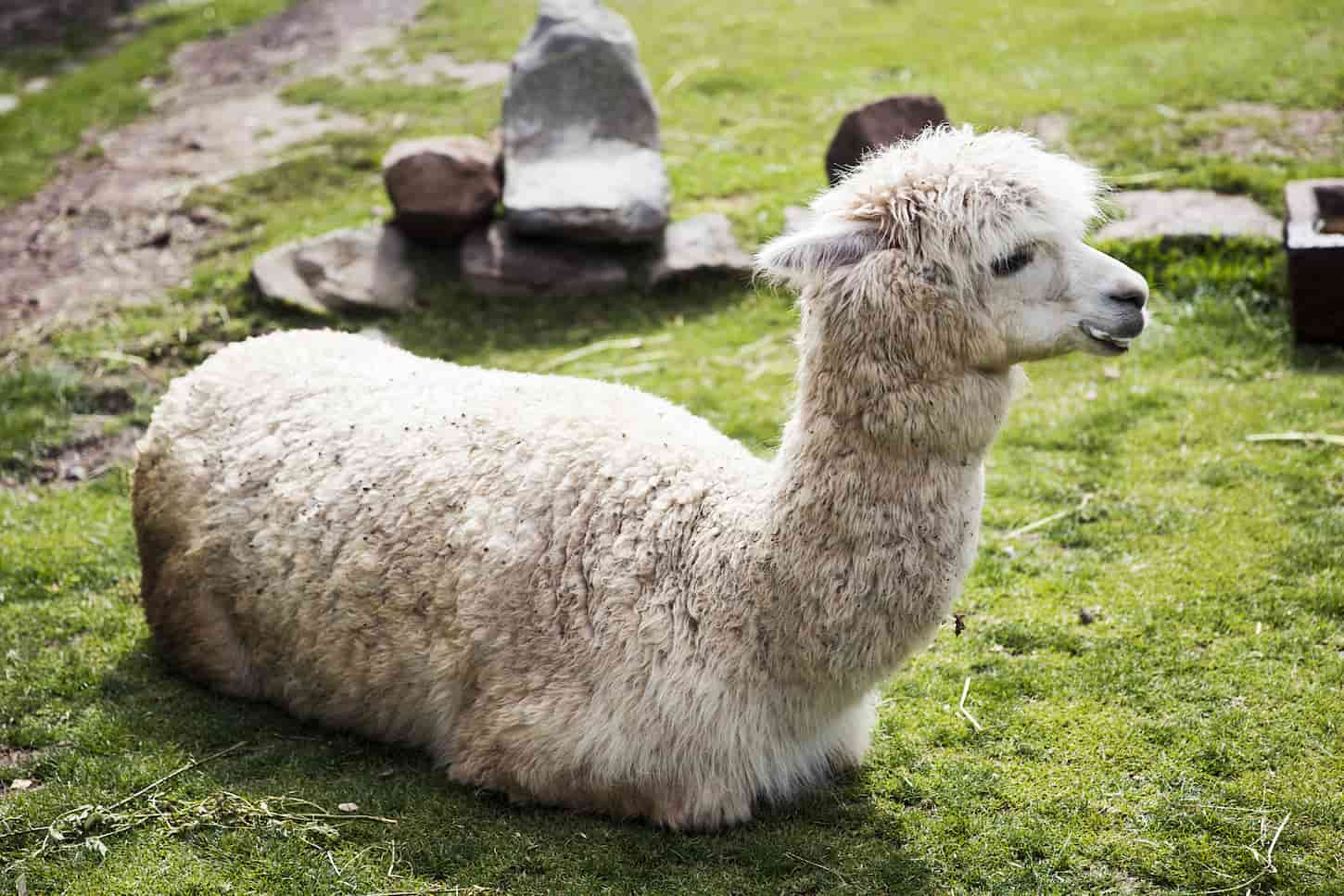Alpacas are fun and friendly animals that you may have seen in a local petting zoo. Or perhaps you own something made from alpaca wool? But how much do you know about keeping alpacas as pets?
Alpacas make good pets that provide wool (fiber), provided they receive proper space and care. Alpacas, when kept as pets, do best with plenty of outdoor space and time as they are livestock rather than a pet who was bred for being kept inside of a house all the time.
Alpacas are an awesome addition to any homestead – and not just because you’ll have all your neighbors jealous of your cute companions! There’s a lot to know about keeping alpacas as pets but don’t worry, we’ve got a pretty comprehensive guide to whether alpacas make good pets (spoiler alert – they do), and how you’d go about looking after them.
Read on to find out more about whether alpacas are the animals for you!

Is Having a Pet Alpaca a Good Idea?
Alpacas can be kept as a pet or as pet-like livestock animals with sufficient resources. Alpacas are medium-sized herd animals that need a herd. With proper amounts of space, time, resources, and money for care (and vet bills) to keep these animals happy and healthy, alpacas can make great pets!
Whether to keep alpacas or not is probably most dependent on your personal circumstances. Alpacas are fairly large herd animals that need care and attention. You’ll need to have the financial resources, space, and time to be able to keep them happy and healthy (including planning for worst-case scenario emergency veterinary bills).
Not only can they provide you with wool, but they’re curious animals happy to provide companionship. Many owners build strong bonds with their alpaca herds, as these are animals that like to hang around their humans when they get a chance.
Just to satisfy any fears you may have about whether it’s safe to keep alpacas, make sure you read our article answering the question: Are alpacas dangerous?
Did you know that alpacas can also be kept as guard animals for sheep? Alpacas were actually domesticated by the Incas not only for their famously soft wool but also to protect livestock.
It’s another reason why some people choose to have some around the homestead! Read our article on it here: Here’s How Alpacas Guard Sheep and Lambs
Alpacas are highly social animals, so it’s not really fair to think about just getting one as it could be distressing for the animal. They are best kept in small herds, although they can also be happy in pairs. Please read our guide to how many alpacas you should get.
There’s a lot to learn about how to keep alpacas. Keep reading to find out more about whether or not they’re high maintenance and all the different things you’d need to do to keep your herd happy and healthy!
Can You Have an Alpaca as a House Pet?
Alpacas can be kept successfully as indoor house pets, though it is rare. These charming creatures prefer to poop in communal dung heaps, so they can even be house-trained with a little patience! However, it’s not their natural environment, and most will prefer a primarily outside environment.
Check out this article all about whether to keep alpacas indoors (and a cute video of a mini alpaca who lives in her owner’s house): Can an Alpaca Live Inside?
How Long do Alpacas Live as Pets?
Alpacas kept as pets can live as long as 30 years, although most alpacas generally live for around 15-20 years. The better nutrition and welfare they get from being kept as pets (or as valued livestock) helps them live longer, healthier lives.
Of course, there are loads of factors that affect how long these animals can live. Read all about the various factors that affect alpaca life expectancy in the article we wrote answering the commonly-asked question: How Long Do Alpacas and Llamas Live?

Do Alpacas Make Good Pets?
Alpacas are great pets for people who want a herd of cute, fluffy animals who give amazing fiber (wool-like hair) while also protecting other livestock animals. Alpacas need a herd, so they should be obtained in groups of 2-3-plus, or be assimilated into a herd of other compatible animals.
Alpacas can make great pets for the right person. However, if you are getting one just because they are cute and cuddly, they might not be for you. Alpacas are domesticated livestock animals, and you will need to take your time in building up a relationship with both the individual animal and the herd.
That said, alpacas are often friendly animals, which when introduced in the right way can enjoy being around children and other animals. They are not too big, and can even enjoy going on adventures, being walked on a leash. They are not overly susceptible to disease and have an uncomplicated diet.
Alpacas are relatively tidy compared to other livestock, preferring to poop in the same place each time like a cat with a litter tray (which can be great for your garden! Check out our article: How to Fertilize with Alpaca Poop: The Complete Guide).
And don’t forget the alpaca fiber! Sometimes people call it wool, but it’s fiber. Alpaca fiber is a valuable commodity, famous for its softness and warmth.
But how much maintenance do alpacas require? Read on to find out about what you’ll have to get up to!
Are Alpacas High-Maintenance Pets?
Alpacas are not high-maintenance, but they do need regular care to keep healthy. Care includes regular vaccinations, shearing, and toenail trimming. These care procedures are more time-consuming, costly, and difficult than with a smaller animal, but are still relatively low-maintenance.
Alpacas aren’t super high-maintenance pets but they do need some regular procedures to keep healthy. This can include twice-yearly vaccinations, shearing, and foot trimming, though, with a gentle introduction from an early age, none of these procedures has to be too tricky.
Be sure to talk to your veterinarian about a vaccine schedule that works for you, your alpacas, and your backyard homestead lifestyle.
In general, it’s just important to think of alpacas as livestock rather than comparing them to cats or dogs. Like with keeping sheep or goats, there’ll be a little manual labor involved in looking after them, whether it’s shoveling poop from their space, carrying their feed, or even going out to look for them if they get scared and run away in a storm!
There will also be a little manual labor involved with alpacas, like cleaning up after them and feeding them.
How to Care for a Pet Alpaca
Pet alpacas require fresh drinking water, food, shelter from inclement weather, and regular care by a livestock specialist veterinarian familiar with camelids.
There’s a lot to learn if you want to care for alpacas successfully. You’ll need to keep them fed through all seasons, provide them with fresh, safe, water, protect them from predators, and groom them (plus deal with any unexpected problems that might come up).
We’ve got some good guidance here that should help you get started, but if you’re going to keep alpacas please also consult your veterinarian and find out as much as you can before doing so.
Alpaca Care Tip #1: Be mindful of nutrition
Good nutrition is key to keeping alpacas healthy. Alpacas, unlike other grazing animals, aren’t true ruminants (they’re pseudo ruminants, which can you read more about in my article here) and require a slightly different diet. Their needs also vary throughout the year based on what forage is likely to be available, and how much energy they’ll be using.
If you’re smart about it, you can even feed your alpacas forage you’re likely to find around your homestead already (including that pesky weed, kudzu).
Here are some articles we wrote on commonly-asked questions about alpacas and their nutrition.
- What Do Alpacas And Llamas Eat?
- Can Alpacas And Llamas Eat Kudzu?
- Feeding Alpacas in the Winter: What, When, and How Much
Commercial alpaca feeds do exist but generally are intended as supplements to a diet rather than complete nutrition. Like other animals, alpacas enjoy tasty treats. If at all in doubt, it’s best to consult a veterinarian or animal nutritionist to be sure that what you’re providing is suitable.
Want to give your alpaca a treat? Here are the 29 Best Treats for Alpacas (and 51 Treats to Avoid) that we’ve found!
As well as food, alpacas need clean, temperate water. This sounds easy, but there are logistical challenges involved sometimes.
- It’s a problem when your alpacas decide to adopt the cute (but annoying) habit of washing their toes in their drinking water. This is a huge problem because it can cause parasite-based illnesses to spread between any animals drinking from the stepped-in water.
- This is also an issue in the winter when water buckets can freeze over. Alpacas always need fresh, drinkable water. So if your winters get below freezing, make sure you’ve got some way to keep the water above freezing. Otherwise, you’ll be out in the freezing weather to water your animals several times a day.
Find out more about keeping alpacas hydrated in our guide below, which covers everything water-related for alpacas and llamas. It covers the varying needs of pregnant alpacas; how to use heated buckets; to keep water available in the winter.
Click here to read the article I wrote on camelids and their water needs now: How Much Water Do Alpacas And Llamas Drink A Day? You’ll be surprised at how much they can drink!
Alpaca Care Tip #2: Keep alpacas safe
Alpacas do have some natural predators, so be aware of that. They are pretty good with most animals, but they will need a careful introduction to the family dog. They recognize dogs as their natural enemies, and this can lead to a mutually dangerous relationship between them and Fido.
Alpaca Care Tip #3: Groom alpacas regularly as needed
There are a few yearly grooming procedures that alpacas need to keep happy and healthy. These include hoof trimming and shearing.
Alpaca Care Tip #4: Be aware of potential behavior problems
Some alpacas (particularly male alpacas) can develop behavioral problems. These range from being aggressive with each other to aggression towards people or other animals (especially something called ‘Berserk Male Syndrome’, where a male alpaca becomes overly familiar with human company).
It’s good to be aware of these in advance, as it can help you recognize problems before they become bigger issues. If you have serious welfare concerns for your animals, you should consult a veterinarian or animal behaviorist immediately.

Do Alpacas Like to be Petted?
Most alpacas don’t naturally like to be petted. With proper socialization, some can learn to enjoy human company and even physical contact. It will depend on the specific animal. You should always ask the owner of an alpaca before going to touch it.
A good rule of thumb for learning whether or not an alpaca is enjoying your attention is to pet it calmly for up to three seconds while watching its reaction. If it moves towards you, it may be asking for more love, while if it seems indifferent or frozen then it’s best to leave it alone.
Never sneak up on an alpaca – while it might be fun for you or your kids to do this, it can really scare the animal (which thinks it’s being attacked) and make it more nervous for people approaching it in the future.
You can learn more about petting alpacas in the article we wrote: Do Alpacas Like to Be Petted?
Do Alpacas Like to Cuddle?
Alpacas are naturally wary of being touched and they are nervous about being petted, cuddles aren’t in their nature. Some alpacas learn to enjoy this kind of contact, especially if sensitized to being touched and socialized by humans at an early age.
A big part of this is learning to approach these beautiful creatures in the right way. Here’s our guide to doing this properly. This is the Right Way to Approach and Interact with Alpacas.
Of course, don’t worry too much if your alpacas don’t learn to enjoy being cuddled. Any good pet owner should learn to understand the body language of their animal and respect their space.
Even if your herd isn’t the touchy-feely types, alpacas are often friendly with human company. Read on to learn more about their nature, and about which breeds of alpacas naturally tend towards socializing with humans!
Are Alpacas Friendly?
Alpacas are definitely friendly animals! While they can be cautious at first (like any pets), after some time getting to know you they tend to come out of their figurative shells as friendly, inquisitive creatures.
At the beginning of owning alpacas, it is often a good idea to hand feed them a little at regular feeding times, letting them come to you. After doing so on a regular schedule, you’ll soon find your herd trotting over to say hello once they spot you.
Alpacas often even learn to get along with children, as long as they learn proper behavior around alpacas, such as avoiding touching them on the head or neck.
Of course, like any animal, each alpaca has a distinct personality. It’s okay for an alpaca not to be super friendly, but they may open up to you after some time.
What is the Friendliest Breed of Alpaca?
Alpacas’ personalities tend to be more individual-based than based on breed. Some owners think of the Suri breed as being more difficult to manage than their Huacaya counterparts, while others observe no difference in breed behaviors.
In general, there are two distinct breeds of alpacas: Suri and Huacaya alpacas. These aren’t true scientific ‘breeds’ but instead are just distinguished by their fleece types.
- Suri alpacas have a thicker coat developed in cooler, higher altitude climates. Sometimes, they look like they have dreadlocks.
- Huacaya alpacas are said to resemble teddy bears.
Both breeds of alpaca come in a wide variety of colors, so you’ll have plenty of choices if you decide to buy some alpacas!
Do Pet Alpacas Love their Owners?
Alpacas can learn to enjoy spending time with humans, especially humans who care for and feed them. These alpacas may even love their owners, although no studies have been done to “measure” how much alpacas love (or dislike) humans.
It’s difficult to say whether alpacas actually come to love their owners (after all, love is thought to be an emotion relatively unique to humans), but as you learn to read your herd’s body language and quirks you’ll definitely notice yourself bonding with them!
Alpacas are super expressive animals. As well as a wide array of body language (varying from freezing in times of stress to relaxed little shifts of their head when they’re more comfortable), they also make a whole host of little noises that you’ll come to interpret in your own way.
These noises range from a quiet humming to the super loud ‘gurgling’ noise (think Chewbacca for this) that male alpacas make during mating season.
Here’s our guide to what some of these noises can mean! Alpaca Sounds 101: 9 sounds & their meanings. Some of them will surprise you – they sure surprised me!
Do Alpacas Get Along With Other Animals?
Alpacas adapt well to other animals. One of the reasons they were kept by the Incas was to protect smaller livestock from predators. While they are likely to be okay with many types of animals, it’s a little harder to introduce them to dogs, who they see as one of their natural predators.
With careful socialization, it’s possible to introduce dogs and alpacas to each other. This might depend quite a bit on the nature of your dog, however. It’s best to take these things slowly, as in extreme cases of alpacas being scared by dogs they have been known to ‘hoof-stomp’ the canines.
If in any doubt about the welfare of your animals living together, it’s always best to consult a relevant veterinarian, behaviorist, or trainer.
We’ve got a little more detail about alpacas and common homestead animals already prepared for you! Follow the links below to find out how alpacas do with some popular pets and livestock.
- Compatible Livestock: Which Animals Go Together?
- Can Alpacas Live with Pigs?
- Are Alpacas OK with Dogs?
- Can Alpacas Live with Horses?
- Can You Run Alpacas and Cattle Together?
- Can Alpacas Live with Goats?
- Can Alpacas Live With Chickens?
If you aren’t sure where to start, read the first link. I wrote that article covering a wide range of livestock, so you should be able to find the answer there!
Which is a Better Pet: an Alpaca or a Llama?
Whether alpacas or llamas are a better choice for your homestead will depend mostly on your needs. Llamas are bigger, stronger animals, capable of carrying more weight. They are great for trekking and protecting livestock, but also produce rougher wool. Alpacas are smaller, fluffier creatures, but less useful for those purposes.
Whether alpacas or llamas are a better choice for your homestead will depend mostly on your needs. Llamas are bigger, stronger animals, capable of carrying more weight so great for trekking and protecting livestock, but also produce a rougher fiber. Alpacas are smaller, fluffier creatures, but less useful for those purposes.
Some people think that alpacas are nicer pets since they are less likely to spit. If you have children, they are less intimidating to them and can develop strong bonds with them.
However, you’ll also find people saying the exact opposite, that llamas are friendlier.
Ultimately, it comes down to nature versus nurture. It seems that either pet can be great around a human company with proper socialization at an early age, with alpacas thought to have a slight natural edge when it comes to interacting with other animals.
There’s a lot more nuance to this, which is probably too much to go into here, but fortunately, we’ve got your back! Check out the link to an article we wrote for you giving you more information on this exact topic: Alpacas and Llamas: Which is Better, Friendlier, Kinder, etc.?

Key Takeaways on Keeping Alpacas as Pets
Alpacas are amazing. Not only are they beautiful, but they’re also a great addition to any backyard homestead because they produce gorgeous fiber, an amazing pile of dung for use as compost, and they’re great companion animals.
But they do need to be kept in a herd – and ideally with a herd of other alpacas. Sometimes, you can keep one alone, but it’s really not the ideal situation. And in other instances, you can keep a singular alpaca as long as it can adopt other herd animals as its herd. But that’s a process that takes time, effort, and a whole lot of treats.
So if you’re ready to add an alpaca to your backyard homestead, whether as a pet, livestock that’s treated as a pet, or just as livestock, make sure you know exactly how to treat them – with the 29 best and safest alpaca treats out there. And as a bonus – many of them are things you’ve already got around the house. So no trip to the feed store is required!
Resources
Learning from your own experience is essential, but learning from others is also intelligent. These are the sources used in this article and our research to be more informed as homesteaders.
- Dalitz, Jen. “‘Do Alpacas Make Good Pets?’” Eagle Rock Farm | NSW Australis: Registered Donkeys, Angus Cattle and Waler Horses, 23 Nov. 2013, Eagle Rock Farm, 23 Nov. 2013, www.eaglerockfarm.com.au/do-alpacas-make-good-pets.
- “‘Do Alpacas Make Good Pets?’” Vethelpdirect.Com, Vet help direct, 5 Jan. 2020, vethelpdirect.com/au/vetblog/2020/05/01/do-alpacas-make-good-pets.
I’ve included quite a few of our Backyard Homestead HQ articles in this one, but we actually have even more out there! Follow these links to discover all about both alpacas and llamas.
